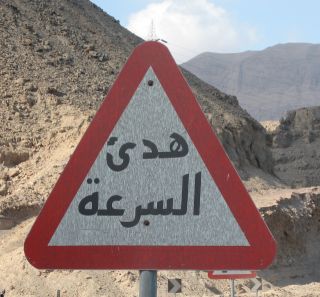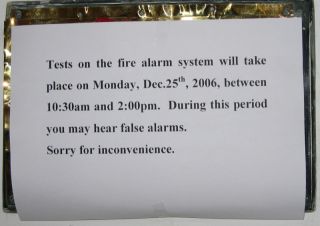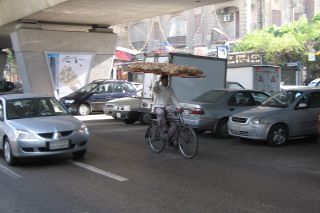We live in “the hostel”. It has a floor of classrooms for Adult/Continuing ed classes, 5 floors of dorm rooms for students and 4 floors of apartments for faculty.
At the end of every semester, the housing department puts up signs for people to make donations of clothing, or housewares or whatever that people want to get rid of. Students returning to the US often dump clothing and some other items off in the boxes. Some of it is still good, but has to be jettisoned to make room for souvenirs. Some of it is crap. Just like donation boxes everywhere, I would guess.
The housing department collects all that stuff. They sort it. The everyday stuff: clothing, shoes (lots of them), books, cds, dvds, casette tapes, vcr tapes, hand bags, get marked and put on tables.
The “big” stuff gets put on the auction table. They had a small TV, several suitcases, a bunch of keyboards, a computer, a table top oscillating fan, etc.
All the money goes to a local childrens cancer hospital.
The doors open at 11AM. I go downstairs around 10:50 to get a cup of tea and to check out the setup. There about 40 or 50 people waiting for the doors to open! All egyptians. Mostly staff (custodial staff, office workers, security guards etc).
The yard sale was held in the glasswall enclosed cafeteria. It is possible to walk around the outside of it on 3 sides. I did that to observe what was for sale. Most of it was stuff I would not want. There were a few items of interest. Like the table top fan that I figured I would see what they go for.
While I was walking around, no fewer than 3 people asked me if I wanted to go inside to check it out before the doors opened. They were insistent that I not wait for the doors to open! I was the only non-egyptian there. I declined and decided to wait.
When the doors opened, it was a mad rush. The words “The Who concert, Cincinnati” came to mind.
Most people headed for the shoe table, which was at the back of for sale area.
Now, egyptians don’t line up for anything. And crowds consist of mostly elbows.
This.. this was a sight to behold. People were pushing and shoving to get to the shoe table. It was all good natured. People were laughing and joking with one another. While they elbowed each other out of the way.
I decided I was not man enough to wade in there during the first crucial minutes. I waited about 10 minutes for things to settle.
Then I went in.
After a quick loop through, I decided the only thing I was interested in was the table top fan. That was on the auction table and I had to wait for that.
When the auction started, the very helpful staff at the hostel kept wanting to intervene on my behalf and tell me what the bidding was. I understand the numbers well enough to be able to follow it on my own, so I said “thanks. I think I can follow it”.
At one point, one of the staff yelled “Englishi” and pointed to me. Everybody turned around to look at me. I smiled and said “La, La. Arabi kwaisz” [no, no. arabic is ok]. Everybody smiled and turned back to the auction, which continued in Arabic. For a while.
Then a smartly dressed young man fought his way to behind the table to stand near the auctioneers. He then proceeded to translate all the arabic numbers for me, looking right at me and repeating them all. I was the only non-arabic speaker in the room. I found it extremely annoying. He was being helpful, but it got under my skin.
What really made me grimace/chuckle was when he translated the very difficult arabic words “tellibishion” and “phillips” for me.
In the end I decided not to bid on anything. It was obvious that these were all local workers who made a fraction of what we make. I could have easily outbid anyone there for anything that I was interested in. But it just didn’t feel right to do so.
I am glad I went to experience it. I haven’t really seen anything quite like it before.


